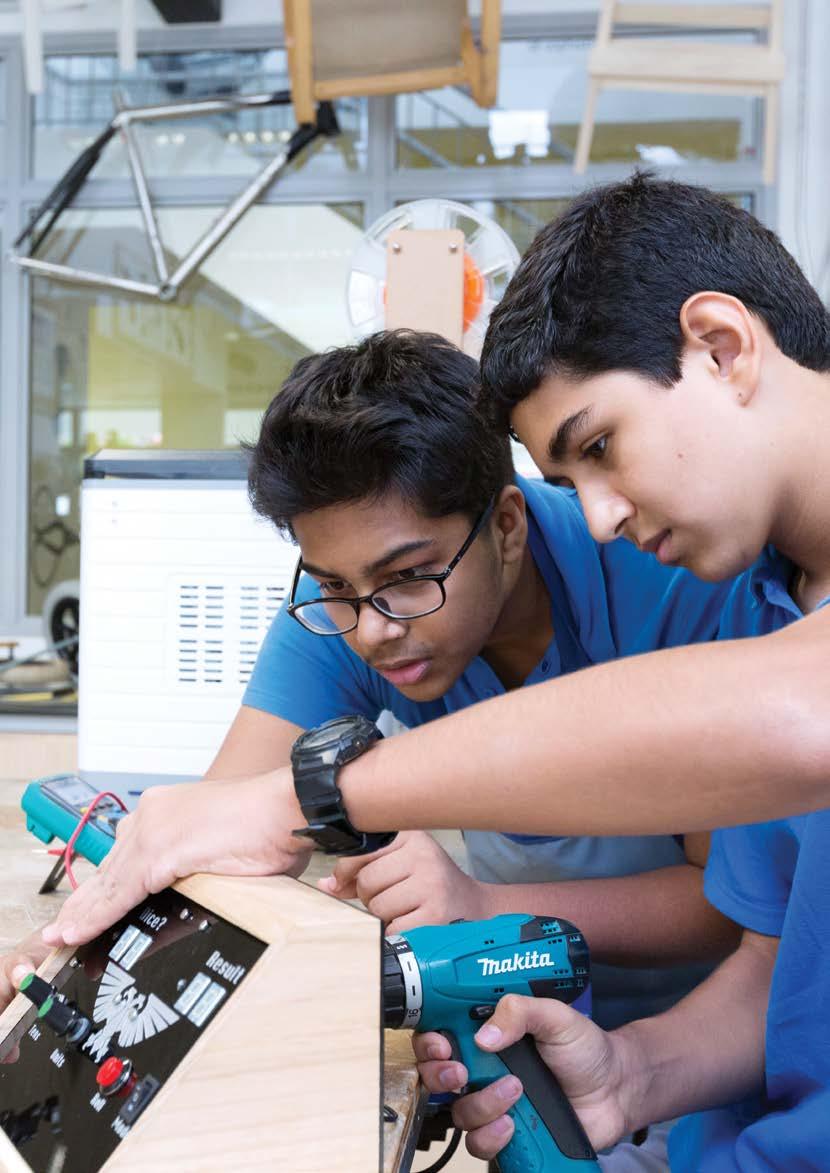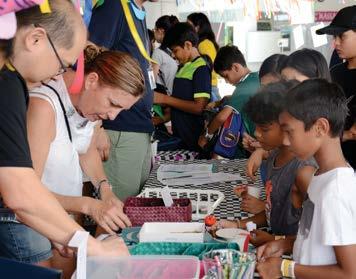
17 minute read
UWCSEA Governance and Leadership
OVERVIEW UWCSEA is committed to the highest standards of corporate governance. The UWCSEA Board of Governors recognises good governance as critical in supporting the school in achieving its mission and educational goal. Good governance begins with the Board of Governors and requires that they set the tone for the organisation. The Board of Governors is one of the principal bodies with the fiduciary obligation to ensure that the College acts to further its stated objectives, and that the College has appropriate systems in place to properly account for and safeguard the funds and assets of the College. The Board of Governors works closely with the management and stakeholders of the College to shape the vision, chart the major directions, and develop programmes and initiatives to produce a strong and enduring impact for the College in Singapore and beyond.
UWCSEA BOARD OF GOVERNORS The UWCSEA Board of Governors comprises 17 members. The Board includes respected business and industry leaders, academics, educators, entrepreneurs and professionals. All members serve on a voluntary basis.
Size, Committees and Meetings The maximum number of Governors is 21. The Board has six committees: • Education and Talent, which sets and oversees education and talent management strategies • Finance and Infrastructure, which oversees the College’s finances and its physical and digital infrastructure • Governance, which is responsible for nominations and governance matters • Audit and Risk, which oversees audit and risk matters • Engagement, which is responsible for improving the engagement and outreach of the College locally and globally, including the UWCSEA Foundation • Committee of Chairs, which functions as a coordinating and management committee among the Chairs of the Board and Committees
Governors periodically re-evaluate the committee structure to ensure it is effective, strategic and forward-looking.
The Board meets four times each year. Each Governor is usually a member of one committee, which also meets four times per year.
Board Effectiveness Review The Board carries out formal Board effectiveness reviews, externally every five years and internally every two years. Heidrick & Struggles were commissioned to conduct an external Board effectiveness review and their report and the Board’s response were made available to the College community in May 2019. Heidrick & Struggles concluded that the Board is effective and that we should celebrate the achievements made in recent years towards effectiveness and impact. As requested, they also recommended a number of ways in which the Board can improve, including providing assurance to key stakeholders on important issues.
As part of efforts to implement the recommendations of the report, work on reevaluating the College values has already taken place. Work has also commenced on evaluating and redrafting the Terms of Reference of each committee and the Board Charter. Other key pieces of work include: • Improving documentation to clarify the independence of all Governors, including those elected by parents and/or staff • Creating efficiencies by streamlining Board and committee papers • Improving induction and support for new Governors and Advisers • Providing useful and tailored training, engagement and team building opportunities for Governors, Advisers and management
Composition The Board consists of three groups of Governors: • Ad Personam Governors – the majority of Governors are appointed by the Board itself through a rigorous selection process. Many Ad Personam Governors are parents of current students of the College. To ensure the Board benefits from independent thinking, there are also several non-parent Governors. • Ex officio Governors – in 2018/2019, the Head of College (Chris Edwards) • Interested Party Governors – these are elected directly by their constituencies and include two parent-elects and two teacher-elects, one from each campus.
Governor Recruitment, Selection and Induction The Board recruits Ad Personam Governors through a robust process that responds to clearly defined skill requirements for the Board. Candidates are first co-opted as Advisers to Board Committees. New Ad Personam Governors are usually only selected from that pool of Advisers who have served on a Committee. Appointments are based on an assessment of the following factors: • Professional skills and fit with Board requirements • Role models for UWC values, culture and alignment with the mission • Demonstrated ability to contribute to a Board • Past contributions to UWC/service institutions • Impact on Board diversity • Leadership potential • Positive impact on government relations
There is a comprehensive induction programme for all Advisers and Governors that includes information about the College and the Board, an induction session with the Board Secretary, and meetings with the Chair of the Board and other Governors.
Term Limits and Reviews Governors serve a maximum of two, three-year terms. Only the Chair may serve up to two additional terms of three years.
The College and the Board holds its Governors and Advisers to a high standard and regularly evaluates each Governor against the following criteria: • is prepared for meetings • listens to and challenges others, when appropriate, while maintaining an atmosphere of respect • contributes and participates in a manner consistent with UWCSEA values • has made meaningful contributions to key decisions • attends most meetings and is highly attentive when present • contributes overall
Whistle Blowing Policy The College has a Whistle Blowing policy through which members of the UWCSEA community may, in confidence, raise concerns about possible wrong-doing or improprieties in financial or other matters within the organisation. The Board thoroughly and appropriately investigates matters brought to its attention through the policy and takes appropriate follow-up action.
Conflict of Interest The College policy requires Board and staff members to disclose any conflict of interest in the performance of their duties. In the case of the Board, the policy requires Governors and Advisers to report potential conflicts to the Governance Committee, which may impose remedies specific to the situation.
Policies on corporate and individual behaviour The Board also adheres to the College’s policies on corporate and individual behaviour, including the Board of Governors Guidelines, Confidentiality Policy, Harassment Policy, Staff Safeguarding Code of Conduct, and the Equal Opportunities, Access and Disabilities Policy.
Commissioner of Charities Oversight The Board has adopted best practices in key areas of governance that are closely aligned with the Code of Governance for Charities and Institutions of a Public Character (the “Code”). In line with the Commissioner of Charities requirements, UWCSEA’s Governance Evaluation Checklist can be found via the Charity Portal website www.charities.gov.sg.
Anna Lord Chair Ad Personam Governor Committee of Chairs
Surinder Kathpalia Chair of Audit and Risk Committee Ad Personam Governor Governance Committee Committee of Chairs
Benjamin Hill Detenber Ad Personam Governor Education and Talent Committee
Kim Teo ’76 Ad Personam Governor Governance Committee
Pamela Kelly Wetzell Interested Party Governor – Teacher Representative Education and Talent Committee Priti Devi Chair of Engagement Committee Ad Personam Governor Committee of Chairs
Heather Carmichael Chair of Education and Talent Committee Ad Personam Governor Audit and Risk Committee Committee of Chairs
Christopher Edwards Ex-Officio Governor Head of College
Margarita Encarnacion Interested Party Governor – Parent Representative Education and Talent Committee Audit and Risk Committee
Vivek Kalra Ad Personam Governor Finance and Infrastructure Committee Subodh Chanrai ’82 Chair of Governance Committee Ad Personam Governor Committee of Chairs
Sajjad Akhtar Chair of Finance and Infrastructure Committee Ad Personam Governor Committee of Chairs
Heinrich Jessen ’86 Ad Personam Governor Governance Committee
Mark Porter Interested Party Governor – Teacher Representative Education and Talent Committee
Seng Chee Ho Ad Personam Governor Education and Talent Committee
Davy Lau Ad Personam Governor Governance Committee
Caroline McLaughlin Interested Party Governor – Parent Representative Engagement Committee
Andrew Budden
UWCSEA BOARD ADVISERS
Philip Motteram Steve Okun WT Cheah Sumitra Pasupathy Sharat Sinha Leon Toh Tara Garson Flower
UWCSEA/UWCSEA-EAST/UWCSEA FOUNDATION COMMITTEES
Audit and Risk Committee Surinder Kathpalia, Chair Heather Carmichael Margo Encarnacion WT Cheah (Adviser)
Education and Talent Committee Heather Carmichael, Chair Chris Edwards Seng Chee Ho Benjamin Detenber Margarita Encarnacion Mark Porter Sumitra Pasupathy (Adviser)
Engagement Committee Priti Devi, Chair Caroline McLaughlin Chris Edwards Steve Okun (Adviser) Leon Toh (Adviser)
Foundation Investment and Disbursement Committee Andy Budden, Chair Kim Teo ’76 Chris Edwards
Finance and Infrastructure Committee Sajjad Akhtar Chair Vivek Kalra Chris Edwards Philip Motteram (Adviser) Tara Garson Flower (Adviser) Sharat Sinha (Adviser)
Governance Committee Subodh Chanrai ’82 , Chair Chris Edwards Davy Lau Surinder Kathpalia Heinrich Jessen ’86 Pamela Kelly Wetzell Kim Teo ’76
Committee of Chairs Anna Lord, Chair Heather Carmichael Subodh Chanrai ’82 Priti Devi Surinder Kathpalia Sajjad Akhtar Andy Budden
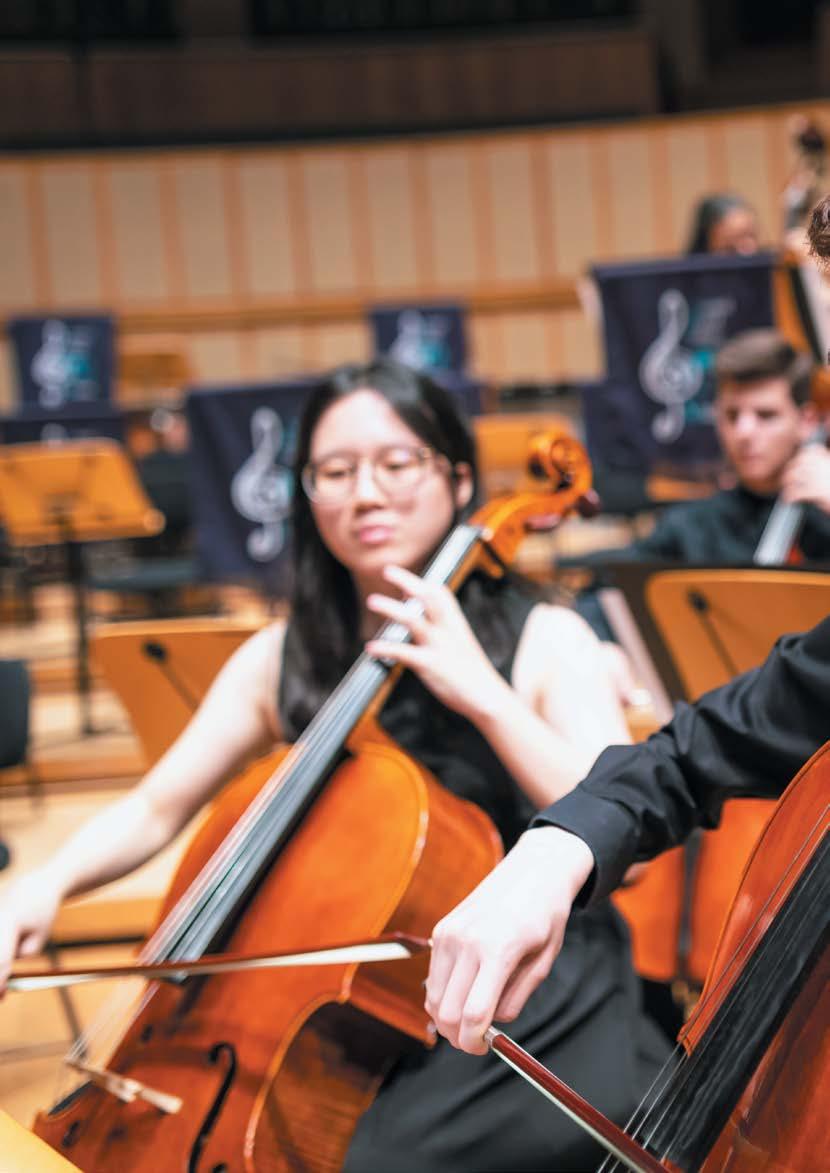
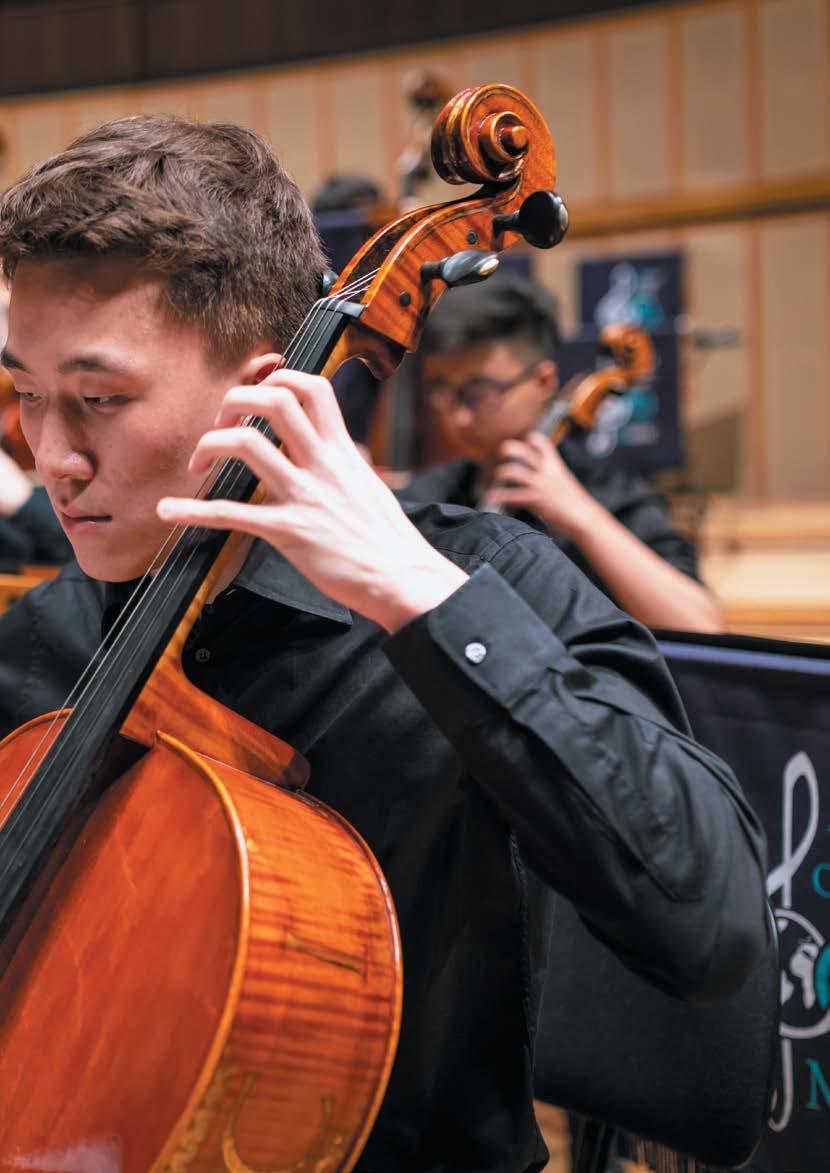
UWCSEA STRATEGY 2018–2023
During the 2018/2019 year, the campuses embarked on enacting the College’s Strategy, based on the Strategic Vision which describes the intended five-year outcome in each of the four Areas of Focus.
The four Areas of Focus identify 10 strategies that have become strands that will help the College to realise these outcomes. These strands then guide planning and decision-making for campuses, schools and operational areas at the College.
During 2018/2019, each campus and operational area began implementation of the multi-year plans for the various projects that will bring these strategies to life. Note that some strands will have been prioritised to receive focus in this first reported school year, while other strands will be reported in more detail in later years. This priority will necessarily be different on each campus given the operational maturity and priorities of each, as identified in the campus-specific strategies that were developed in response to the launch of the College-wide strategy.
The Board of Governors oversees progress through a report on an Area of Focus at each of the four meetings during the year, while the senior leadership teams monitor the detailed projects.
The following is an outline of the UWCSEA Strategy 2018–2023, highlighting 2018/2019 outcomes.
UWCSEA STRATEGIC VISION Students will be equipped with the qualities and skills to become compassionate, engaged global citizens who seek to make a positive contribution towards peace and a sustainable future. To achieve this, a diverse, united and caring College community will focus creatively on students learning through a dynamic, holistic programme that supports individuals, their well-being and their readiness for an uncertain future. Effective operational practices will provide for the College’s long-term future in Singapore.

PEACE AND A SUSTAINABLE FUTURE
EDUCATION AS A FORCE
AREAS OF FOCUS UWCSEA STRATEGY
A UNITED COMMUNITY

OUR STRENGTH AND CAPACITY
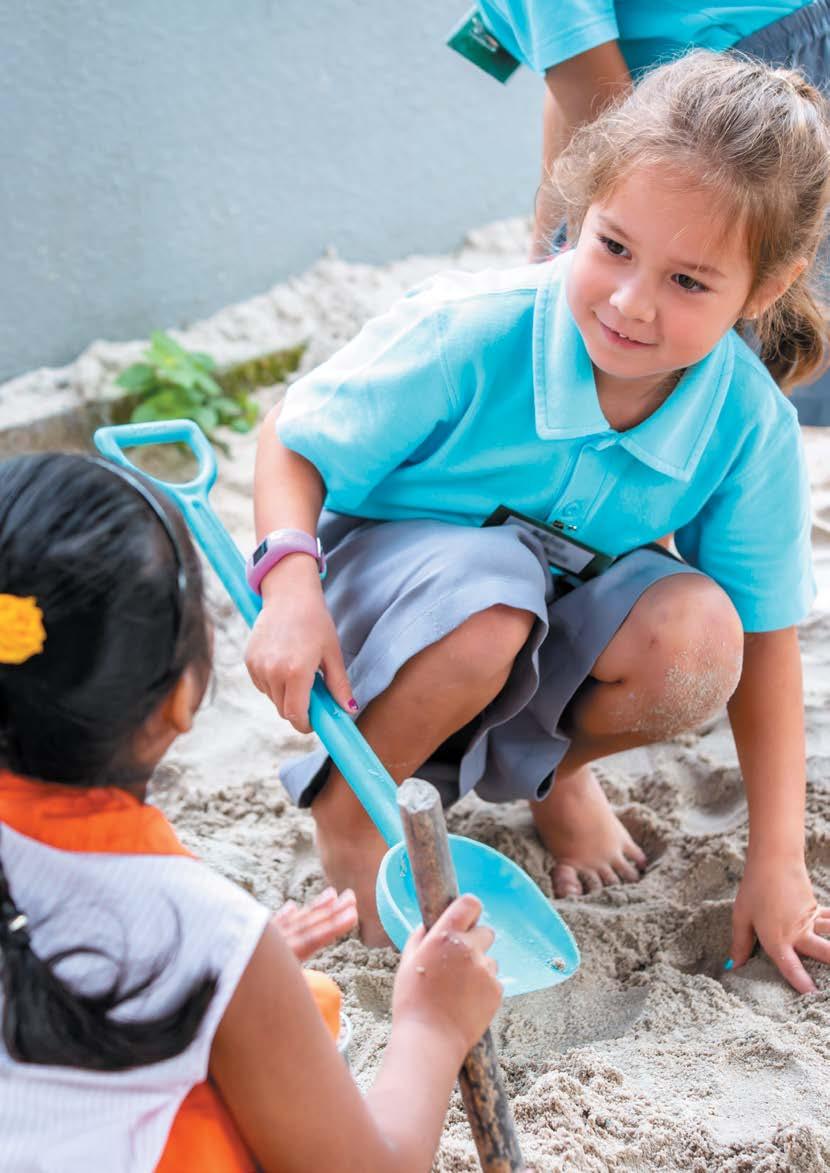
At UWCSEA, we educate our students to impact on individuals and society in accordance with the UWC mission. Through a holistic Learning Programme, students develop the skills and qualities (which meld to form the UWCSEA Learner Profile) to fulfil their potential and become life-long learners and ethical agents for change. EDUCATION AS A FORCE
We understand educational excellence to be manifested by student learning across all five elements of our Learning Programme. This spirit of excellence, balanced with a serious commitment to well-being, will help inspire our community to rich experiences and high achievement. Our innovation will align with our values. We will take scalable, safe-to-fail approaches to probe and test the boundaries of our strategies and practices. Within the contexts of Singapore and our Learning Programme, we will seek to be inclusive and diverse, in accordance with our definitions of these concepts, and we will recognise the importance of intercultural competence. Key developments during 2018/2019 year: Strategy E1: Extending Excellence • Embedding of pedagogical approaches to concept based teaching and learning • Development of our structures to support digital learning, creating significant coherence between campuses • College wide development of data analysis to inform learning and strategy • Launch of a review of the learning programme, evaluating current guiding statements and future development Strategy E2: Deliberate Innovation • Working groups to review innovative approaches to school timetabling convened • Development of pilot courses in Grade 9 and 10 to support Diploma Learning in Grade 12 and personal growth for students
Strategy E3: Diversity and Inclusion • Two World Cafés allowing the community to come together to define the concept of diversity for UWCSEA • Follow-up survey and analysis of data from World Café process
PEACE AND A SUSTAINABLE FUTURE
Peace and a Sustainable Future
Our community is strengthened by diversity and united in common purpose. On local, national and global platforms, we will seek to engage with and impact positively on individuals and communities who hold similar, disparate and diverse ideas.
All members of our community should understand Peace to include concepts such as justice, equality and human rights and to be more than the absence of conflict. Our Learning Programme will help seed and nurture these concepts. We aspire to promote Peace in all of its contexts—for the individual, our communities and our global societies. We will embed structures to support learning for Peace and its systematic implementation across the College, and develop meaningful links with like-minded organisations that are in pursuit of the same goals.
Sustainability as a systemic response means aligning ourselves to the UN Sustainable Development Goals to end poverty, protect the planet and ensure prosperity for all within the means of nature. We will engage with these challenges by deepening our intellectual and moral capacities, and building our collective wisdom. We will develop our curriculum to ensure that sustainability is woven into all five elements of our learning programme from K–12. We will also develop our community’s capability in systems thinking.
Key developments during 2018/2019 year:
Strategy P1: Working for Peace • Engagement of a team to develop a Peace curriculum that will be transferable to multiple contexts (and potentially other schools) Strategy P2: Sustainability as a Systemic Response: • Redesign of the leadership teams to establish campus based leadership • Review of the interaction between Service and environmental sustainability • Further progress on solar panel projects and sustainability learning spaces • Further progress with Sodexo caterers on sustainable approaches to food service • Sustainable approaches to parent sponsored events introduced
A strong College community, based on shared values, is fundamental to our success. Our community members will demonstrate respectful attention to diverse needs and perspectives, and compassionate engagement with others. A UNITED COMMUNITY
We seek to promote the educational significance of UWC residential life and will seek to harmonise the best of the day and residential experiences. We will strengthen relationships with one another, between campuses and with those outside our immediate community of students, staff and parents. We will build strategic relationships that extend our reach and deepen our impact. We will intensify the focus of the UWCSEA Foundation, enhance Alumni engagement, and continue to dedicate an agreed percentage of our annual turnover to scholarships. Our fundamental responsibility to our community members is to keep them safe, well and secure at all times and in all situations. We will continue to develop robust safeguarding practices, and empower our community to identify and respond to safeguarding situations. We will implement policies, practices and programmes to support staff and student wellness and safeguard everyone in our community.
Key developments during 2018/2019 year: Strategy C1: Strengthening our Community • Strategic planning for the future of Boarding embracing structures, staffing and the Residential Life curriculum • Refinement of induction and on-boarding practices for students and staff • Adoption of middle leadership development plan • Review of the Personal Learning Programme on Dover Campus • Parents’ Association developed additional programmes to further support College initiatives
Strategy C2: Keeping People Safe and Well • Creation and update of policies and procedures to support safeguarding practices, including compulsory training for all staff • Development of UWCSEA Culture of Care providing an overarching approach to wellbeing • Incorporation of Safe Behaviours learning into the PSE curriculum, adapted to UWCSEA context from Keeping Safe: Child Protection Curriculum
Our Strength and Capacity
UWCSEA puts people, not systems, first. Our plan for sustainable growth will be transparent and support our community, while reflecting and responding to current realities and future possibilities. We will guarantee the financial security of the College while balancing present and future educational, environmental and organisational needs. OUR STRENGTH AND CAPACITY
In order to retain education as our focus, we recognise the necessity of humane, sustainable and effective systems.
We will develop operational systems that set a positive, data-informed culture around rigorous practices, adhering to all external regulatory requirements. In adapting to any changes, we will support our community and protect the College’s ethos and values.
We will establish decision-making processes and leadership structures that enhance operational effectiveness while retaining flexibility to adapt to changing circumstances. Key developments during 2018/2019 year:
Strategy S1: Ensuring Long-term Financial Sustainability • Implementation of zero-based budgeting to increase visibility and management for budget holders • Implementation of new procurement policy • Decision to create an investment sub-committee to oversee management of College reserves Strategy S2: Embedding Effective Systems • Preparation for implementation of new, efficient modes of invoicing and payment eg. online invoicing of school fees; enabling payments via PayNow • Implementation of a formal and standardised performance management system for administrative and support staff • Comprehensive compliance structures to support student fundraising
Strategy S3: Establishing Effective Decision-Making Structures • Establishment of College Leadership Team (CLT), representing both educational and operational leadership, and including the new role of College President • Recruitment of College President
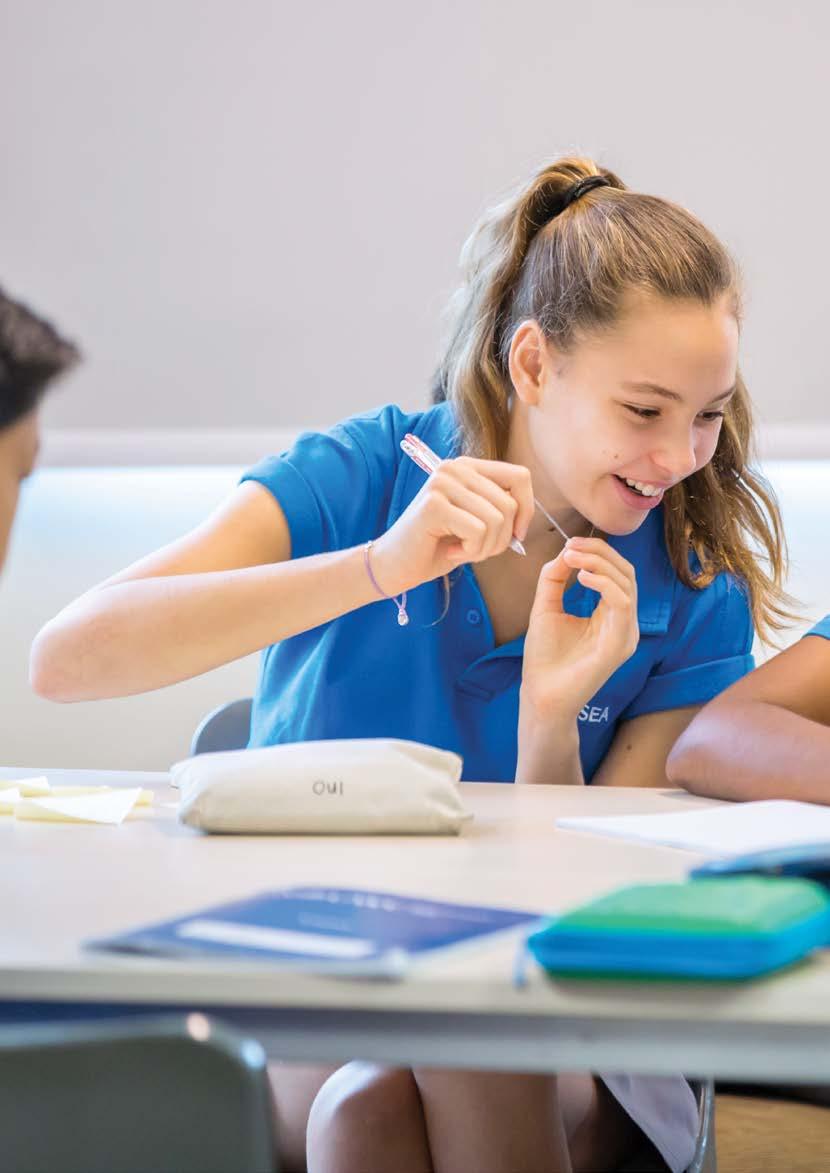
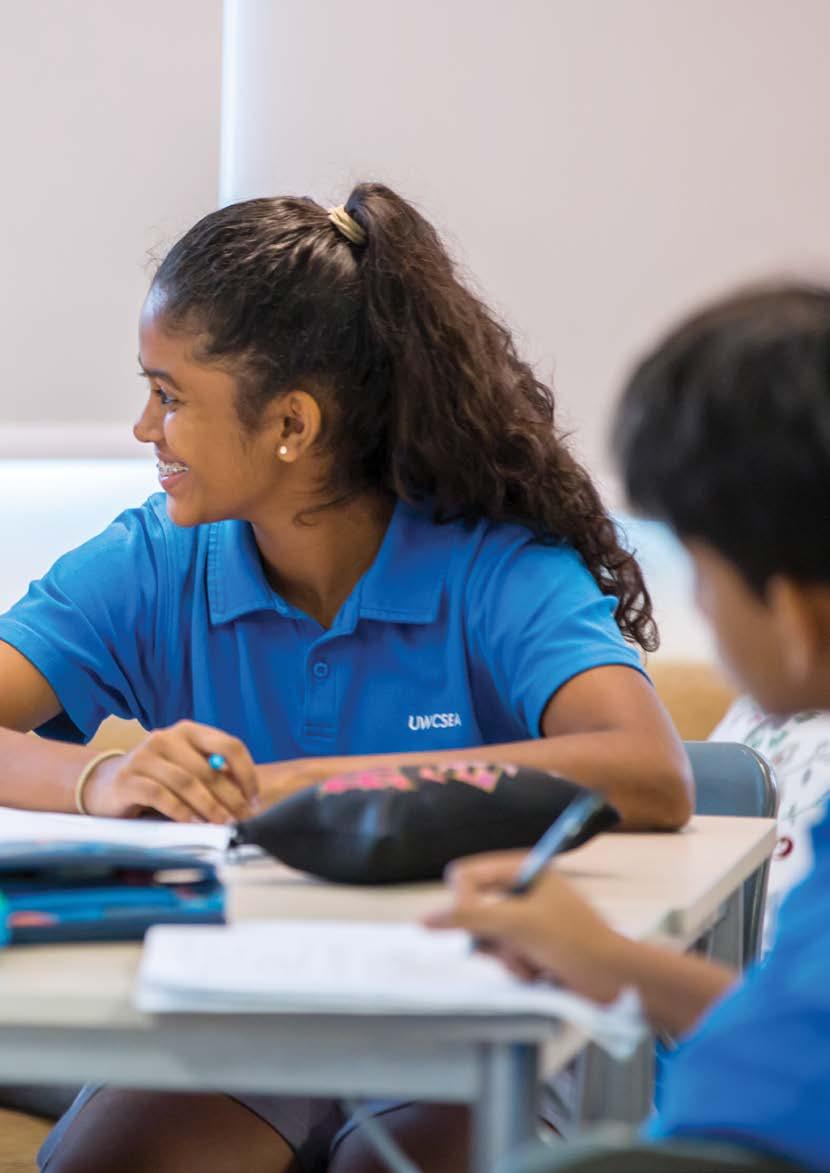
STUDENT ACHIEVEMENT
Our goal is to educate individuals to embrace challenge and take responsibility for shaping a better world. In order to prepare our students to meet this ambitious goal, our holistic learning programme has been deliberately designed to encompass five interlinking elements: academics, activities, outdoor education, personal and social education and service. These elements combine to provide our students with a values-based education that develops them as individuals and as members of a global society.
Through the learning programme, students develop disciplinary knowledge, skills and understandings alongside the skills and qualities of the UWCSEA Learner Profile. Rationales are written for all five of our programme elements, outlining the purpose for its inclusion in the UWCSEA learning programme. In the 2018/2019 school year, the rationale for the Activities element of the programme was reviewed and refinements were agreed for implementation in the following school year.
LEARNING IN ACTION The five elements of our learning programme complement each other to create a whole that is greater than the sum of the parts. This is a carefully planned and purposeful process, where students develop understanding in disciplinary and interdisciplinary ways. For example, students gain deep disciplinary understanding in our academic programme, which may be applied in outdoor education or service when students encounter and grapple with real world situations.
STORIES UWCSEA
The case studies included in this section of the report have been selected to illustrate the learning taking place across the College, highlighting both the concept-based nature of the curriculum and the intentionally interconnected nature of the five elements of our learning programme.
UWCSEA CONCEPT-BASED CURRICULUM The bespoke concept-based K–12 curriculum was designed to develop the knowledge, skills and understandings that will challenge our students to make their education a force to unite people, nations and cultures for peace and a sustainable future. Through exposure to the five elements of our learning programme students: • learn to think independently, laterally and critically about the world • form an understanding of sustainable development, integral to the UWC mission • develop cultural awareness, through language learning and College diversity • recognise complexity and the interconnectedness of issues • are prepared to lead and act with integrity in a globalised, rapidly changing world
UWCSEA was the first educational institution in the world to develop and implement a concept-based learning programme in all learning areas, extending a common structure across four of the five elements of our learning programme: Academics, Outdoor Education, Personal and Social Education and Service.
UWCSEA LEARNER PROFILE Opportunities to develop the skills and qualities identified in the UWCSEA Learner Profile are embedded in all five elements of the programme. Where a meaningful connection is made, intentional development of a specific aspect of the UWCSEA Learner Profile has been explicitly linked to the associated benchmark to indicate the profile skill or quality that is being developed. These are then used in our communication to teachers, students and parents.
